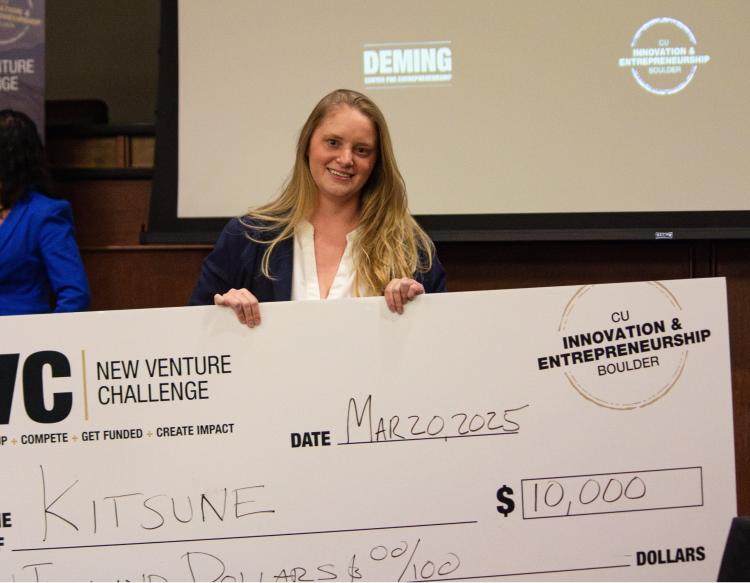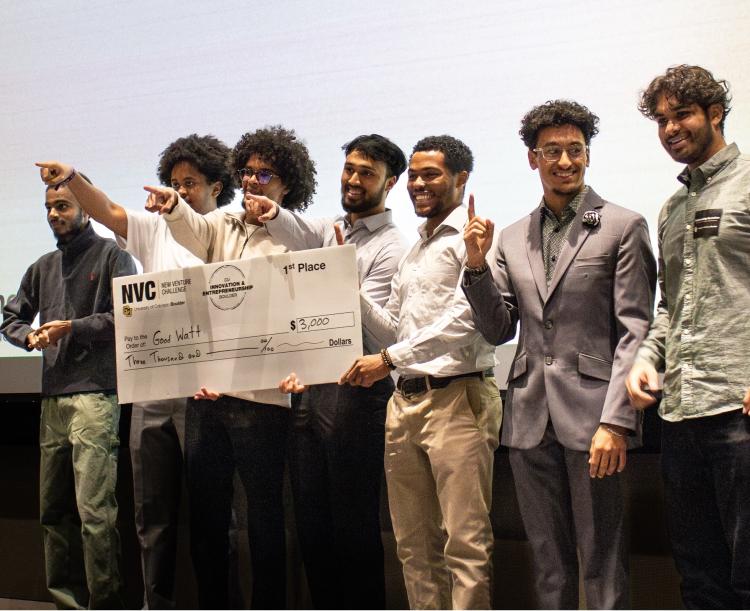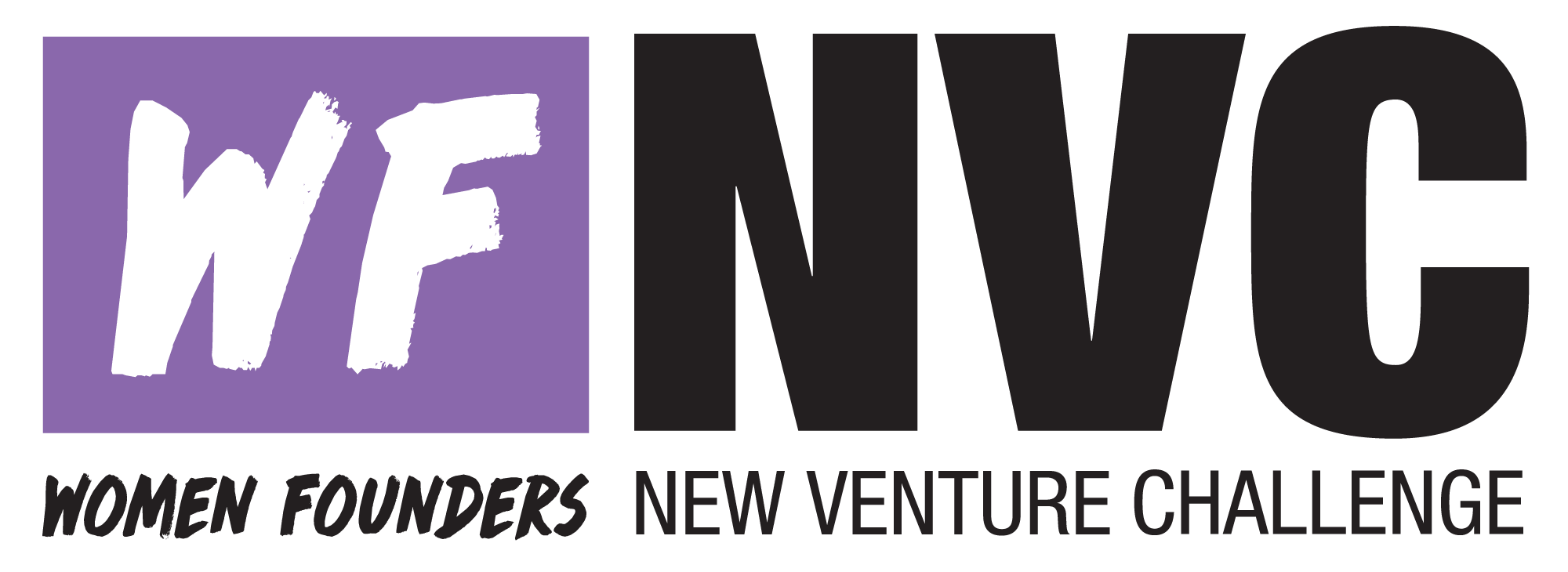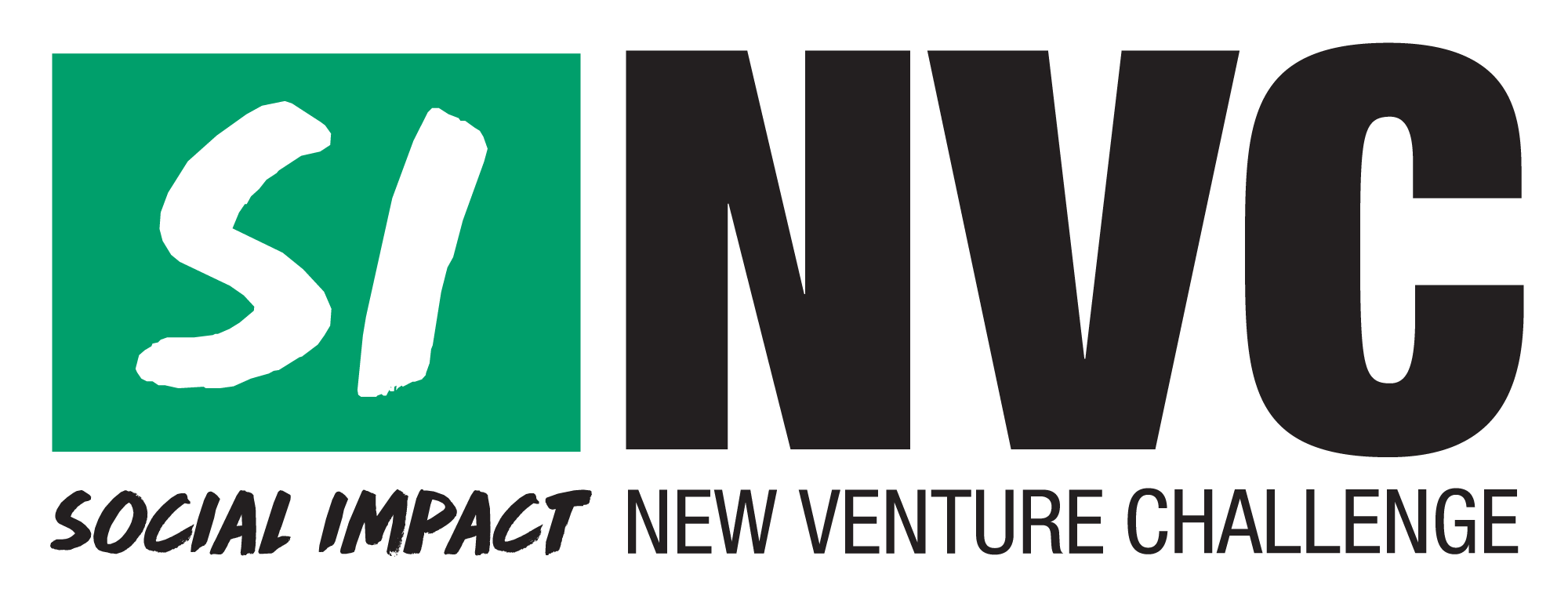Congratulations to our 2025 NVC Specialty Competition winners!
Winners of two NVC Specialty competitions were announced at the NVC Finals on April 23. The NVC Specialty competitions are comprised of the Women Founders New Venture Challenge (WFNVC) and the Social Impact New Venture Challenge (SINVC).

Makenna Morck, CEO of Kitsune Bio, received a $10,000 check as the winner of the Women Founders Competition of the New Venture Challenge (WFNVC).
WFNVC is a multi-round entrepreneurial competition and signature program of CU Boulder’s Innovation & Entrepreneurship Initiative, led in collaboration with the Deming Center for Entrepreneurship. Teams with at least one core team member who is a woman can participate in this specialty competition and win a share of $15,000! The top team secured a spot in the TiE U Colorado competition, designed to help fast-track collegiate entrepreneurs' innovative ideas into market-ready ventures.
Kitsune Bio took first place in the Women Founders New Venture Challenge, earning $10,000.
Solution: Unlocking complex disease treatment through next-generation shape-shifting cyclic peptides.
Team Members: Makenna Morck (alum, CU Boulder Biochemistry), Alec Santiago, PhD (UT MD Anderson Cancer Center UTHealth Houston Graduate School of Biomedical Sciences), Michael Stowell, PhD (CU Boulder Molecular, Cellular & Developmental Biology), Thomas Fallon, PhD (University of Adelaide).
2025 WFNVC Finalist Teams:
EPI+
Solution: A Next-generation epinephrine-administering device.
Team Members: CU Boulder students Sutton Lindau (Leeds School of Business), Mackenzie Bonebrake (Leeds School of Business), Brenton Yu (College of Engineering and Applied Science), Charlie Misraje (Leeds School of Business), Matthew Winston (Leeds School of Business), Royce Quinones (Leeds School of Business)
Flari:
Solution: A laser breathalyzer for biomedical applications using a Nobel Prize-winning technology born out of JILA—a joint institute between the National Institute of Standards and Technology and CU Boulder.
Team Members: Eva Yao (CEO), Qizhong Liang (JILA), Greg Rieker, (professor, College of Engineering and Applied Science)
PrecisionTerra
Solution: Improving GPS signal tracking in challenging environments like large cities.
Team: Maithreyi Gopalakrishnan (alum, CU Boulder Physics), Dr. Dmitriy Zusin (LumenAstra)
R Place
Solution: A go-to destination for families to play, work and connect.
Team Members: CU Boulder students Michelle Grabau (Leeds School of Business), Reya Roussel (Colorado Law), Anirudh Kalghatkar (College of Engineering and Applied Science)
SINVC is an offshoot of NVC, where teams can win up to $5,000. First and second place teams have automatic acceptance into the July SEA Change Social Enterprise Accelerator Cohort, a social enterprise accelerator that helps entrepreneurs learn how to launch and scale impactful businesses.

SINVC winning team, Good Watt, also won the 2025 Sustainability Hackathon.
What is a Social Enterprise? A social enterprise is an organization that operates with the primary goal of addressing a social, environmental, or community issue through its business activities. Unlike traditional businesses that prioritize profit, social enterprises aim to generate revenue while simultaneously creating positive social impact. These organizations often reinvest a significant portion of their profits back into their mission to further their social goals. Social enterprises can take various forms, including for-profit companies, non-profit organizations with income-generating activities, or hybrid models. The key characteristic of a social enterprise is its commitment to balancing financial sustainability with social responsibility.
Good Watt took first place in the Social Impact New Venture Challenge competition, winning the $5,000 first prize and automatic acceptance into the July SEA Change Social Enterprise Accelerator Cohort.
Solution: A device that helps consumers monitor and reduce energy waste.
Team members: CU Boulder students Talha Ather,(College of Engineering and Applied Science), Hudson Curtis, Samir Dherar (College of Engineering and Applied Science), Nabil Djaber (College of Engineering and Applied Science), Nathan Mahary (College of Engineering and Applied Science), Mohamed Mohamedali and Zuhair Rao (College of Engineering and Applied Science).
SphereSix came in second, winning automatic acceptance into the July SEA Change Social Enterprise Accelerator Cohort.
Solution:A platform for farmers that predicts profits from soil carbon capture.
Team Members: CU Boulder students Sophia Benning (Leeds School of Business), Jayden Kazantsev (Leeds School of Business), Jemima Pemberton (Leeds School of Business) and Parker Secrest (College of Engineering and Applied Science).




